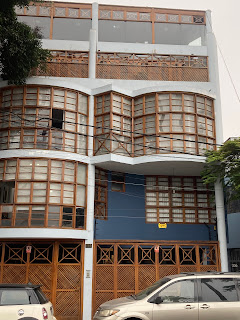On Wednesday, June 26th, we drove along the lake to the town of Chucuitla, where we visited a fertility temple from pre-Inca times.
We stopped at a market to pick up sacks of rice and pasta as a gift for the village we were going to visit.
We drove out into the countryside to see some ancient waru waru, the Aymara term for an agricultural irrigation system of ditches and raised ridges.
We headed back toward Lake Titicaca, stopping at an overlook to view the lake and the snow-capped high Andes in Bolivia, on the far side.
We drove along the lake, through a small town, then stopped below a village. We went up and were met by a group of elderly people, who, while they demonstrated how they baked potatoes, told us about their lives. They now had electricity and running water, and children went to school in the nearby town, but they lived on bartering their potatoes and quinoa in the market towns. Actual cash was not something they saw much of. It appeared that most of their children got jobs in the cities and only came back for festivals and to help with the harvest.
When the potatoes were done, we sat together for lunch. Our group had more elaborate (but vegetarian) dishes, while the villagers made do with potatoes.
On the way back to Puno, we stopped by a large field, where a number of people were working with potatoes. At this altitude (over 12,000 feet) nighttime temperatures are below freezing. In order to preserve potatoes, farmers spread them out in fields like this one and let them freeze. The next day they squeeze the water out of the potatoes by stepping on them with their bare feet, creating a sort of freeze-dried potato that stores very easily and can be reconstituted in water. After asking permission from one of the women, Pepe asked for volunteers to squeeze some potatoes. When he said that there was no water available to clean people's feet, he didn't get any takers, so he (for the first time, he said) and Broz did it instead.
That evening, the group had dinner at the hotel. Later, Mary Joy and I spent some time down in the lobby, overlooking the lake.

















































































